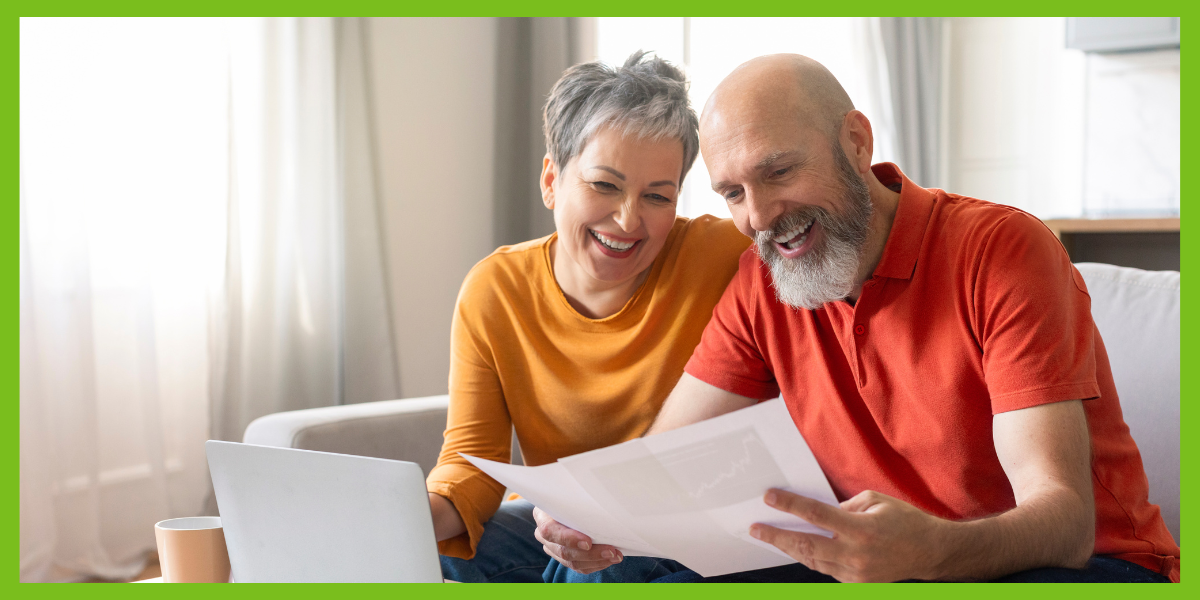Insights You Can Learn from Your Tax Return

You can use your annual tax filing as a valuable feedback loop for tax-saving strategies. Many Americans are missing opportunities to learn more about their tax situation. These insights can help you build strategies to save on taxes throughout your lifetime – not just year to year.
The real goal in tax planning is to reduce your total tax bill using tools and strategies allowed by law. You want to pay all the taxes you owe, but you’re not trying to overpay either. Continually reevaluating and reassessing is the key to doing this.
Table of Contents
Key Differences in Tax Refunds vs. Owed Taxes
What does it mean if you received money back this year as a tax return? You may have heard this is like giving Uncle Sam an interest-free loan for the year. This has truth to it, but there are so many other insights you can gain from looking at your tax return.
To be clear, if you overpaid (received a large tax return) or underpaid (owed taxes), you should consider adjusting your withholding and estimated tax payments. Using your money throughout the year is typically better than locking it up with the IRS until tax season.
Effective Tax Rate vs Marginal Tax Rate
Another thing to consider is your effective tax rate. The effective tax rate is the total amount of tax paid divided by your income. It differs from your marginal tax rates, which are commonly called tax brackets.
You pay less tax on the first dollar earned and more on the last dollar earned. In other words, only income over the limit for each tax bracket gets taxed at the higher rates. Once you calculate your effective tax rate, it shows your tax rate across all income.
So, if you have only a little income in the highest tax brackets, most of your income may still be taxed at the lower tax rates. Even though it may seem you’re paying more in taxes, your effective tax rate (based on total taxes paid) may be lower once you factor in all deductions, credits, and income counted toward lower tax brackets.
Checking for Errors
Mistakes still happen even if you pay an accountant to file your taxes. This is why it’s important to always review your tax return and ensure your financial planner also takes a look. It’s not uncommon for something like a qualified charitable contribution (QCD) to get missed if you didn’t inform your accountant.
This is why having a second set of eyes on your tax return can be handy. If the mistake is caught soon enough, it can usually be corrected. You’ll also want to make sure any unusual withdrawals and transfers are reported correctly.
Analyzing Tax Return Insights
You can find ways to save on taxes by carefully looking at sources of income for the year. It may be possible to shift some income or employ tax-saving strategies to lower your total tax bill. Sometimes, you can “front load” some taxes through strategies like Roth Conversions or tax-gain harvesting.
Analyzing Deductions and Credits
Reviewing the credits and deductions you qualified for last year can be really helpful. If you were really close to the income thresholds and phaseouts for certain credits and deductions, this is important to know so you can plan accordingly. You may be able to shift some income to avoid reaching those thresholds or at least make sure you’re withholding enough for taxes.
Deductions and Credits You Can Still Utilize
There may be some deductions and credits you didn’t qualify for last year, but you may be able to qualify for them this year. Popular credits, like the Clean Vehicle Tax Credits, have income phaseouts too.
Regardless, being able to plan out your tax year based on what’s going on in your life is really powerful. We don’t want our lives controlled by taxes, but we don’t want to miss out on tax savings.
Maximizing Tax-Advantaged Accounts
You’ll want to ensure you’ve properly leveraged tax-advantaged accounts like retirement accounts, college savings, or donor-advised funds. These accounts can help you qualify for tax deductions or shift income to the most helpful years for you. This helps you achieve your financial goals more efficiently.
Start Planning for Tax Season Now
Each tax return is just one data point among many other key factors. It also only shows one year. It's best to zoom out and look at your entire financial picture to reduce taxes over your lifetime.
Understanding Your Income Sources
You must identify different income streams and make your best income estimates this year. Think about these different thresholds, like The Price Is Right. You want to be as close as possible without going over.
Your income taxes might not be as critical, but exceeding thresholds for capital gains or Medicare surcharges can be a real pain. As we mentioned, you could miss out on some credits and deductions if your adjusted gross income (AGI) is too high.
The Role of Tax Strategies
There are many different tax-saving strategies you can employ. However, you might not feel comfortable with some strategies or not understand others. Roth conversions are one of the more common strategies we see and use.
The Role of Roth Conversions
Roth conversions essentially move money from your tax-deferred account like a traditional 401k or IRA into your Roth IRA. You have to pay taxes on the money converted now, but then it can grow tax-free from then on. You’re basically paying the taxes sooner.
But I Thought Deferring Taxes Was a Good Thing?
It can be confusing to consider what we’re doing here. When traditional 401ks and IRAs were created, there was no Roth option. The rules on required minimum distributions (RMDs) and inherited IRAs were also much different.
In short, tax laws change all the time. Now we have to take RMDs, and there’s no longer a “stretch” IRA like there used to be. However, with careful planning and early implementation, you can avoid getting hit with RMDs and save on taxes in the long run.
Implementing Tax Strategies for the Future
Your tax liabilities will change over time. In earlier years, reducing your taxable income to help qualify for student aid might have been more beneficial. In later years, you may have a dip in income between jobs to harvest some investment gains at lower rates.
However, when we zoom out to look at your total taxable lifetime, we want to use the full range of tools available. For example, if you usually give to charity but don’t normally itemize deductions, a bunching strategy or gifting appreciated stock may be helpful. The result is the same in both cases, but you pay less in taxes.
The ultimate goal is to find ways to optimize taxes for your lifestyle – not the other way around.

Understanding the Long-term Impact of Decisions Today
The bottom line is that every decision you make in each phase of retirement affects the other. Avoiding thinking about tax strategy doesn’t help either. Actually, if you’re headed for an RMD problem, it’ll only get worse over time.
Technically, Congress could change the laws in your favor, but that’s not a great strategy. We can only plan based on the best information we have today. This is also why we work so hard to keep up with changes in tax law, so you don’t have to.
Can you ace this basic tax literacy quiz? See what you know & don't know (& why it matters).
How NextGen Wealth Uses Tax Insights to Help Our Clients
At NextGen Wealth, we use our experience and advanced software to analyze your tax returns and identify key areas of opportunity. We integrate these into your personalized financial plan to ensure you get the most out of your retirement.
We’re also monitoring all of our clients’ accounts and tax returns to ensure smooth implementation. Follow-through is the most important part of any strategy.
Catching Common Mistakes or Miscommunications
A key benefit of having a financial planner on your team is catching mistakes and correcting them. Sometimes, paperwork doesn’t give tax professionals all the information they need.
For instance, a qualified charitable distribution (QCD) doesn’t appear as a special code on your tax documents. Your tax preparer must know it was a QCD, or they won’t know to help you report this to the IRS. It looks like any other distribution on your 1099s, so this gets missed sometimes.
Luckily, we meticulously track all taxable events for our clients and can help catch this. If caught early, it’s usually a fairly easy fix. We’re also conducting an analysis to identify potential tax-saving strategies for this year and throughout retirement.
Contact us today to see if we’re a good fit and schedule your free financial assessment. Start planning your retirement and take action to save on taxes today!